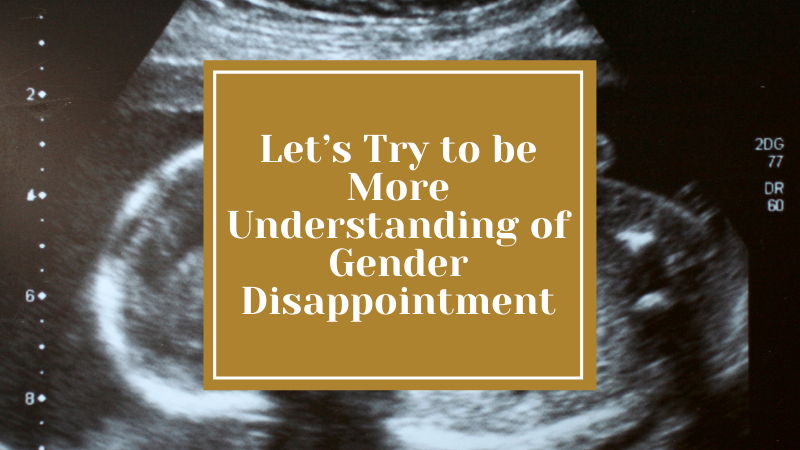Gender disappointment is what happens when a parent thinks they know what they’re going to happen or have envisioned having a certain sex for a long time, only to discover that they’re actually having the opposite gender at birth or during an ultrasound.
It can take many form including tears, anger, dissociation during pregnancy or birth, and depression.
Here’s some examples of what it’s looked like in my personal life:
- A friend struggling with gender disappointment for months after finding out that her first pregnancy was going to be a boy and not a girl as she’d always imagined. She had a name picked out for a girl for years, but couldn’t bring herself to come up with a boy name until after he was born.
- A friend who always wanted a son, only to end up having six daughters.
- A friend and her husband who both felt strongly that they had a spiritual connection with a son and that they were meant to have a boy their entire marriage. In her forties and after years of infertility struggles, she had her third girl. She’s not sure if it will even be possible for her to get pregnant again, but feels a little incomplete still even though she loves her daughters.
- A friend who had just “one more” pregnancy in hopes of getting a boy after already having three girls, only to discover she was having twin girls.
- The woman getting an ultrasound before me leaving the room crying because the anatomy scan revealed that she was actually having a boy, and not the girl she’d been told she was having during early testing and had already fallen in love with.
- My mother, after strongly believing that she was supposed to have another baby girl having another baby boy in her thirties. She cried because she felt very strongly that she was meant to have one more baby girl, even still, but her pregnancy had been so hard that she didn’t know if she could go through it again.
It doesn’t matter if you’re experiencing gender disappointment with a first pregnancy or a later pregnancies. You may have had just one more to try and get another sex, only to discover you’re having another of the same sex. Or you may have imagined having your family a certain way your whole life only to discover that’s now how it’s actually happening. There are many reasons it can happen and every single person deserves to have their feelings understood and validated no matter the reason.
The problem with gender disappointment is that many people are not sympathetic to what the parents may be feeling. They say things like, “At least you’re having a healthy pregnancy.” Or, “You’re lucky. I always wanted that gender.” Or, “You’re going to grow to love them! I love all of my gender!”
These comments are meant well, but they don’t feel that way to the person experiencing gender disappointment. They feel as though you’re trying to get rid of the problem, instead of validating their experience. These comments can instead make the parent feel as though they shouldn’t be feeling this way, are a bad parent for not being excited, or like they aren’t allowed to feel disappointed because things could be worse. Because of these feeling and the shame that comes with them, they may feel pressure to say the “right” thing and hide what they’re really feeling.
Instead, what a person experiencing gender disappointment needs is usually just someone to listen to them and offer some understanding. Let your family and friends talk about their experiences and just try to lend some understanding instead of solving their problem. You can’t solve their problem for them. Only time and themselves can make the gender disappointment ease.
It might be true that they’re lucky to be having a healthy baby, especially when it seems like more and more couples are struggling with infertility and health problems. It may also be true that they will grown to love their child no matter the gender. But these things don’t mean that they aren’t allowed to feel disappointed, grieve, and process their emotions in the meantime. Just because things could be worse, and things could always be worse, doesn’t mean that you have to be happy all the time.
It can also be hard for parents going through gender disappointment because of the countless social media gender reveals, where couple are screaming and jumping for joy after the sex of their baby is revealed, make it seem like not many people experience gender disappointment.
If you are experiencing gender disappointment, I want you to know that you’re not alone. Many, many people have experienced this to some degree throughout their childbearing years. How can a person not feel this to some degree when so many people start playing house at a young age and envisioning their future families. I had my future family all planned out since I was like five years old. I had names picked out. I knew exactly how many kids I would have and what each one would be.
I remember sitting there during my first pregnancy thinking so badly that I wanted my first to be a girl like I’d always imagined, and worried that I wouldn’t be as happy if I found out it was a boy. I did end up having a girl, but I know I would’ve felt some disappointment if I’d been told I was having a boy since I was already experiencing some disappointment when I thought about that possibility. I know I would’ve learned to love a son, and still hope to have a son someday, but it wouldn’t have been what I was imagining and falling in love with at the time.
I plan to have one or two more babies. I would really love a boy to add to my girls, but I know that’s not guaranteed. While I think I’m at peace with the possibility of never having a boy, that might change when I’m actually on my last pregnancy and really have to come to terms with never having one. Only time will tell.
You May Also Like:



